
Sierra Leone, officially the Republic of Sierra Leone, is a country on the southwest coast of West Africa. It shares its southeastern border with Liberia and is bordered by Guinea to the north. With a land area of 71,740 km2 (27,699 sq mi), Sierra Leone has a tropical climate and with a variety of environments ranging from savannas to rainforests. According to the 2015 census, Sierra Leone has a population of 7,092,113, with Freetown serving as both the capital and largest city. The country is divided into five administrative regions, which are further subdivided into 16 districts.
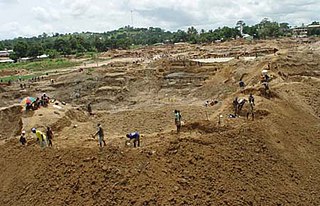
The economy of Sierra Leone is $4.082 billion by gross domestic product as of 2018. Since the end of the Sierra Leone Civil War in 2002, the economy is gradually recovering with a gross domestic product growth rate between 4 and 7%. In 2008 it in PPP ranked between 147th by World Bank, and 153rd by CIA, largest in the world.

Blood diamonds are diamonds mined in a war zone and sold to finance an insurgency, an invading army's war efforts, terrorism, or a warlord's activity. The term is used to highlight the negative consequences of the diamond trade in certain areas, or to label an individual diamond as having come from such an area. Diamonds mined during the 20th–21st century civil wars in Angola, Ivory Coast, Sierra Leone, Liberia, Guinea, and Guinea-Bissau have been given the label. The term conflict resource refers to analogous situations involving other natural resources. Blood diamonds can also be smuggled by organized crime syndicates so that they could be sold on the black market.
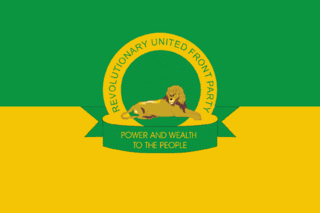
The Revolutionary United Front (RUF) was a rebel group that fought a failed eleven-year war in Sierra Leone, beginning in 1991 and ending in 2002. It later transformed into a political party, which still exists today. The three most senior surviving leaders, Issa Sesay, Morris Kallon and Augustine Gbao, were convicted in February 2009 of war crimes and crimes against humanity.
The leone is the currency of Sierra Leone. It is subdivided into 100 cents. As of 1 July 2022, the ISO 4217 code is SLE due to a redenomination of the old leone (SLL) at a rate of SLL 1000 to SLE 1. The leone is abbreviated as Le placed before the amount.
Yengema is a town in Kono District in the Eastern Province of Sierra Leone, lying approximately 6 miles (9.7 km) west of Koidu Town, and about 142 miles (229 km) east of Freetown. The major industries in and around Yengema are diamond mining and agriculture. The town is home to Yengema Airport, the main airfield serving Kono District. A 2012 estimate of Yengema population was 13,358 people.
The Sierra Leone Civil War (1991–2002), or the Sierra Leonean Civil War, was a civil war in Sierra Leone that began on 23 March 1991 when the Revolutionary United Front (RUF), with support from the special forces of Liberian dictator Charles Taylor's National Patriotic Front of Liberia (NPFL), intervened in Sierra Leone in an attempt to overthrow the Joseph Momoh government. The resulting civil war lasted almost 11 years, and had over 50,000, up to 70,000, casualties in total; an estimated 2.5 million people were displaced during the conflict.
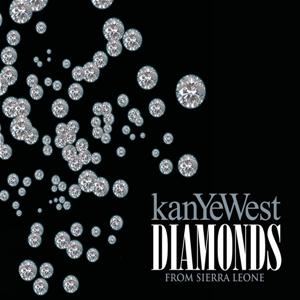
"Diamonds from Sierra Leone" is a song by American rapper Kanye West from his second studio album, Late Registration (2005). The song was produced by West, Jon Brion, and Devo Springsteen. The producers, with the exception of Brion, are credited as songwriters alongside John Barry and Don Black, who both received credit due to their composition being sampled. The song was initially centered around the demise of Roc-A-Fella Records, though was later re-recorded once West learned about blood diamonds in Sierra Leone. West premiered the song for Hot 97 on April 20, 2005, before it was sent to US mainstream radio stations the following month as the album's lead single, through Roc-A-Fella and Def Jam. In the chorus, West interpolated the phrase "forever ever, forever ever" from OutKast's "Ms. Jackson".

The Eastern Province is one of the four provinces of Sierra Leone. It covers an area of 15,553 km2 and has a population of 1,641,012. Its capital and administrative centre is Kenema. Eastern Province, the centre of the country's diamond mining industry, is very mountainous and has two ranges, the Gola Hills and the Loma Mountains.
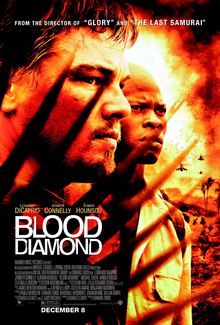
Blood Diamond is a 2006 American political action thriller film directed and co-produced by Edward Zwick and starring Leonardo DiCaprio, Jennifer Connelly, and Djimon Hounsou. The title refers to blood diamonds, which are diamonds mined in war zones and sold to finance conflicts, and thereby profit warlords and diamond companies around the world.
Fort Collins Weekly was a weekly community newspaper serving the city of Fort Collins, Colorado. It had a circulation of 33,700, making it the largest weekly newspaper in northern Colorado. It was purchased by Swift Communications in July 2007, and renamed Fort Collins Now. Swift Communications ceased publication of the paper in May 2009.

Boulder Weekly is an alternative newsweekly that publishes every Thursday in Boulder, Colorado. The paper is a member of the Association of Alternative Newsweeklies (AAN) and is owned and published by Stewart Sallo.
Jamil Sahid Mohamed Khalil was a Sierra Leonean-Lebanese businessman, diamonds and commodities trader. He attained prominence in the diamond industry across Africa and Antwerp and became an influential figure in the politics of Sierra Leone through his close association with President Siaka Stevens. Jamil also came to dominate other business sectors including fisheries, tourism construction and aviation.
Greg Campbell is an American journalist, documentary filmmaker and nonfiction author who lives in Denver, Colorado with his wife.

The mining industry of Sierra Leone accounted for 4.5 percent of the country's GDP in 2007 and minerals made up 79 percent of total export revenue with diamonds accounting for 46 percent of export revenue in 2008. The main minerals mined in Sierra Leone are diamonds, rutile, bauxite, gold, iron and limonite.

The 2013–2016 epidemic of Ebola virus disease, centered in Western Africa, was the most widespread outbreak of the disease in history. It caused major loss of life and socioeconomic disruption in the region, mainly in Guinea, Liberia and Sierra Leone. The first cases were recorded in Guinea in December 2013; later, the disease spread to neighbouring Liberia and Sierra Leone, with minor outbreaks occurring in Nigeria and Mali. Secondary infections of medical workers occurred in the United States and Spain. In addition, isolated cases were recorded in Senegal, the United Kingdom and Italy. The number of cases peaked in October 2014 and then began to decline gradually, following the commitment of substantial international resources.
The Sierra Leone Diamond is a 709-carat, alluvial diamond found in 2017 by workers hired by Pastor Emmanuel Momoh in river sediment in Koidu village, Kono district, Sierra Leone. It has since been renamed The Peace Diamond.

Corruption is endemic in Sierra Leone. Sierra Leone is widely considered to be one of the most politically and economically corrupt nations in the world and international rankings reflect this. Transparency International's 2023 Corruption Perceptions Index scored Sierra Leone at 35 on a scale from 0 to 100. When ranked by score, Sierra Leone ranked 108th among the 180 countries in the Index, where the country ranked first is perceived to have the most honest public sector. For comparison with worldwide scores, the best score was 90, the average score was 43, and the worst score was 11. For comparison with regional scores, the average score among sub-Saharan African countries was 33. The highest score in sub-Saharan Africa was 71 and the lowest score was 11. The 2018 Global Competitiveness Report ranked Sierra Leone 109th out of 140 countries for Incidence of Corruption, with country 140 having the highest incidence of corruption. Corruption is prevalent in many aspects of society in Sierra Leone, especially in the aftermath of the Sierra Leone Civil War. The illicit trade in conflict diamonds funded the rebel Revolutionary United Front (RUF) forces during the civil war, leading to fighting between the Sierra Leone Army and the RUF for control of the diamond mines. Widespread corruption in the health care sector has limited access to medical care, with health care workers often dependent on receiving bribes to supplement their low pay.
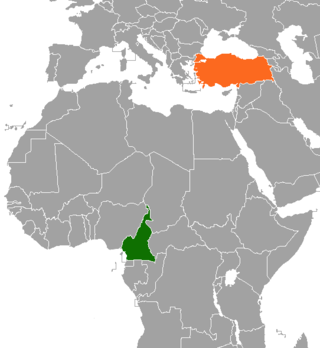
Cameroon–Turkey relations are the foreign relations between Cameroon and Turkey.










